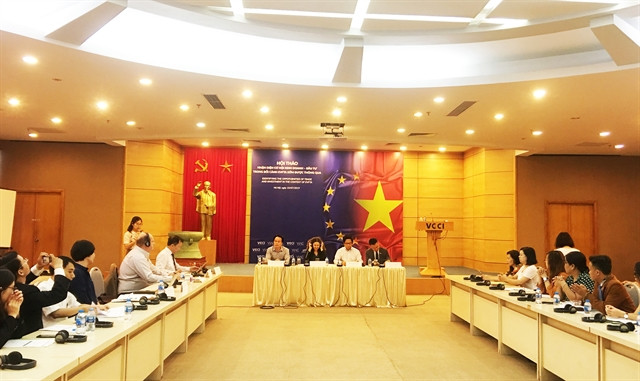 The seminar on business and investment opportunities arising from the EU-Vietnam Free Trade Agreement (EVFTA) on June 10 in Hanoi. (Photo: qdnd.vn)
The seminar on business and investment opportunities arising from the EU-Vietnam Free Trade Agreement (EVFTA) on June 10 in Hanoi. (Photo: qdnd.vn)Hanoi (VNS/VNA) - Opportunities provided by free trade agreements(FTAs) will only exist on paper if local authorities and enterprises do nottake prompt and concrete actions to take advantage, experts said at a meeting inHanoi on July 10.
Vietnam has signed many trade deals with different countries and regions butboth local authorities and businesses have been slow to prepare plans for thesechanges, said Ngo Chung Khanh, deputy director of the Ministry of Industry andTrade’s Multilateral Trade Policy Department.
Speaking at the seminar on business and investment opportunities arising fromthe EU-Vietnam Free Trade Agreement (EVFTA), Khanh said inertia is common amongVietnamese authorities and businesses. He expressed his fear that businessesare not doing enough to take advantage of the ongoing implementation of theComprehensive and Progressive Agreement for Trans-Pacific Partnership (CPTPP).
As an example, Khanh cited the Prime Minister's request for local authoritiesand ministries to build action plans to implement CPTPP. To date, only a fewhave submitted their proposals.
"Up to now, we’ve yet to receive full action plans from ministries,sectors and localities," he said. "Implementation is too slow and ifwe continue this stagnancy then all the presentations on opportunities willremain on paper and never become a reality."
EVFTA and CPTPP are two new-generation FTAs with a broad scope and the highestlevel of commitments that Vietnam has ever signed. Under the two trade deals,some reference calculations estimate Vietnam’s gross domestic product (GDP)could increase by between 1.3 percent and 1.6 percent.
EVFTA has a very short schedule for tariff reduction with many Vietnameseproducts enjoying tariff-free exports to the EU. Vietnam's competitors in theregion such as China, Thailand and Malaysia have not signed an FTA with the EU,but that does not mean they never will. Khanh told businesses they must movequickly to take advantage of the FTA while Vietnam is in an advantageousposition.
He pointed out the indifference of local businesses to the trade deal. Only twoforeign direct investment enterprises have sent questions on issues of taxcodes or rules or origin concerning EVFTA.
Vietnam and the EU signed EVFTA and the Europe-Vietnam Investment ProtectionAgreement (EVIPA) on June 30. Khanh said the two agreements would be submittedto the National Assembly for approval in October this year and the EuropeanParliament would vote around the same time to hopefully have the deals takeeffect next year.
Vu Tien Loc, chairman of the Vietnam Chamber of Commerce and Industry (VCCI),said Vietnam’s economic openness was second in ASEAN only to Singapore but itscompetitiveness and capacity for integration were still low.
Vietnam placed 77th out of 140 countries in the 2018 Global CompetitivenessReport by the World Economic Forum. It placed 99th for institutionalcompetitiveness and 101st in business competitiveness.
The EU is highly demanding market and has little direct competition with Vietnamso Vietnamese products have advantages, Loc said.
To make the most of their strong position, he said local businesses mustsatisfy many requirements for origins, environmental standards, labourrelations and sustainable development. This means they need to restructuretheir production processes and technologies.-VNS/VNA





























